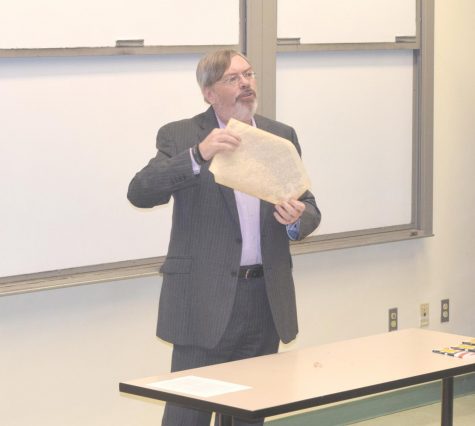Constitution Day celebrated with lecture
Wilkes University’s political science and history departments along with the pre-law program acknowledged Constitution Day with a lecture from Dr. John Hepp.
Hepp began his lecture for Constitution Day by explaining the “cat walking ordinance” in his Philadelphia neighborhood, in which cats could not roam the neighborhood freely but instead must be leashed when outside.
Hepp explained that this ordinance was enacted 94 years ago when the flowerbeds of a particularly powerful person were continually dug up by cats. He laughed at the idea of leashing a cat saying, “If anyone owns a cat, they know the absurdity of this is quite apparent.”
This humorous introduction led to Hepp explaining his understanding of the law, which he emphasized as “not of the intellectual battles of legal history, [and] not who followed what philosopher in the creation of each phrase.”
“I see the law as a practical thing. People had problems and people had to turn to the law to solve them,” he said.

Dr. John Hepp held a replica Constitution during the lecture.
Hepp’s understanding of law also applied to his understating of the United States Constitution.
“The lecture was enjoyable. I have had Dr. Hepp for classes in the past and it was nice to see him give this lecture,” said senior history and education major Domingo Franciamore. “Since Dr. Hepp’s original degree is in law it was interesting to see him discuss the Constitution from that aspect as well as the pure historical context.”
Hepp focused the lecture on the events leading up to the American Revolution and how these events shaped the Constitution and the Bill of Rights. He discussed the quartering of soldiers, the unjust taxation and the 36 other complaints the colonists made about the king of England. These complaints were made into laws preventing these actions from happening again.
Joey Verespey, a second-year pharmacy student, saw the lecture as a chance to understand the Constitution in a new way.
“We do not really talk about Constitution Day ever, even in elementary school, but it is interesting to hear American history framed from the perspective of the Constitution.”
Throughout the lecture, while Hepp dismantled the Constitution he also explained how certain government systems came to be. He walked through the differences between the English government and the American government, explaining how one developed from the other. His narrative of the events before and during the American Revolution followed in parallel to his discussion of the creation of the Constitution.
After the lecture Hepp was asked if Americans understanding of the Constitution had changed.
“I think what we see the Constitution as is some sort of level playing ground,” he explained. “I think the problem is as the nation has changed our understanding and our expectation of the Constitution has changed. So consequently, I think we respect the Constitution as much as we have at any time in our history.”
“I think the problem is that a constitution that made sense when America was mostly farmers or residents of small towns, now struggles in making the same sense in modern America,” Hepp continued. “The challenge is more of what our hopes and expectations are and less to do with the Constitution itself.”
When asked why it was important for students to understand the Constitution, Hepp explained that the document “both sets up our government and gives us our rights.”
So, it is important to know what we have a right to do and what we just like doing. We are going through a time of dynamic change and also very dynamic disagreement. It is important that both the process and the people be respected.”
Hepp is a professor of history at Wilkes, who currently teaches modern U.S. and World History. Hepp has a law degree from the University of Pennsylvania and has practiced law in Philadelphia. He earned his Ph.D. at the University of North Carolina. He has numerous publications and is currently studying the rise of public international law.